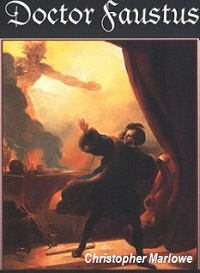 Answer: Marlow’s view of the tragic hero does not completely conform to classical view of it. The classical conception of the tragic finds expression in chapter xiii of Aristotle’s Poetics. The feelings of pity and fear, according to Aristotle, are the distinctive mark of tragic imitation. It therefore follows that the change of fortune in tragedy must not be the spectacle of a virtuous man falling from prosperity to adversity because this kind of thing would merely shock us and would excite neither pity nor fear. Similarly, a bad man must not be shown in tragedy as passing from adversity to prosperity because this sort of thing would be absolutely alien to the spirit of tragedy. This sort of situation satisfies neither the moral sense nor excites pity and fear. Nor, again, should tragedy exibit the downfall of the utter villain. Such a situation would certainly satisfy the moral sense, but it would inspire neither pity nor fear because pity is aroused by the misfortune of a man like us. There remains then a character between these two extremes. He would be neither villainous nor exceptionally virtuous. He should be a man of high rank who moves from happiness to misery as a result of his frailty or error in judgment.
Answer: Marlow’s view of the tragic hero does not completely conform to classical view of it. The classical conception of the tragic finds expression in chapter xiii of Aristotle’s Poetics. The feelings of pity and fear, according to Aristotle, are the distinctive mark of tragic imitation. It therefore follows that the change of fortune in tragedy must not be the spectacle of a virtuous man falling from prosperity to adversity because this kind of thing would merely shock us and would excite neither pity nor fear. Similarly, a bad man must not be shown in tragedy as passing from adversity to prosperity because this sort of thing would be absolutely alien to the spirit of tragedy. This sort of situation satisfies neither the moral sense nor excites pity and fear. Nor, again, should tragedy exibit the downfall of the utter villain. Such a situation would certainly satisfy the moral sense, but it would inspire neither pity nor fear because pity is aroused by the misfortune of a man like us. There remains then a character between these two extremes. He would be neither villainous nor exceptionally virtuous. He should be a man of high rank who moves from happiness to misery as a result of his frailty or error in judgment.
Marlow’s tragic heroes do not abide by all these conditions. They agree partially. For example, Faustus is of an ordinary German parent who goes to Wittenberg for higher studies mainly supported by his kinsmen. He is not from a royal or noble parentage. But he is great because of his scholarship. Like Macbeth, he is an ambitions hero. He denounces God, blasphemes the Trinity and Christian doctrines and sells his soul to the Devil to gain superhuman power and to live a life of voluptuousness for twenty four years. His fate is settled when he signs the contact. He utters such blasphemous words:
“Had I as many souls as there be stars,
I’d give them all for Mephistophilis
By him I’ll be great emperor for the world”.
Marlow achieves distinction by infusing the Renaissance spirit in his tragic hero. Faustus with his yearning for knowledge proceeds to study necromancy. He responds to the suggestions of the Evil Angel to attain the position of a “Lord and Commander of the world”. He tries his best to gain a deity and commits a sinful act. He sells his soul to acquire unlimited power to probe the secrets of the universe.
[adToAppearHere]
Like some other great tragic heroes, Faustus also suffer from conflict. Like Hamlet, his conflict is also inner. Faustus choice of necromancy is made after inner conflict. The appearance of the Good and Evil Angel side by side are the personifications of his good and evil impulses. His conventional heart is opposed to his self damnation but he ignores all the warning and completes the scroll. As the time rolls on, he becomes more and more disillusioned about the profits he expected from magic and the growing sense of loss and the wages of damnation begins to sting him like a scorpion:
“When I behold the heaven, then I repent,
And curse thee, wicked Mephistophilis,
Because thou hast deprived me of these joys.”
The basic thing about a tragic hero is his tragic flaw which brings about his doom and disaster. The tragic flaw in the character of Faustus is thirst for unlimited power and pleasure. He submits himself to the appetites of sensuality. As his mounting desires bear him further and further, the horror of his career grows darker. At last he comes to the impassable point and meets his doom.
Click Here to buy the original book from amazon.
The tragic hero deserves pity and fear. According to the classical view a tragic hero must arouse pity and fear in the heart of the audience. In this respect Dr. Faustus does not go an exception. Faustus’ universal appeal for life, when he says;
“My God, my God, look not so fierce on me!
Adders and serpents, let me breathe a while!
Ugly hall gape not! Come not Lucifer!
I’ll burn my book! Ah, Mephistophilis.”
touches the heart of the audience. Pity and sympathy for the Faustus are aroused in this scene. Thus, Dr. Faustus may be regarded as the tragic hero since he conforms to the basic properties of a tragic hero.




